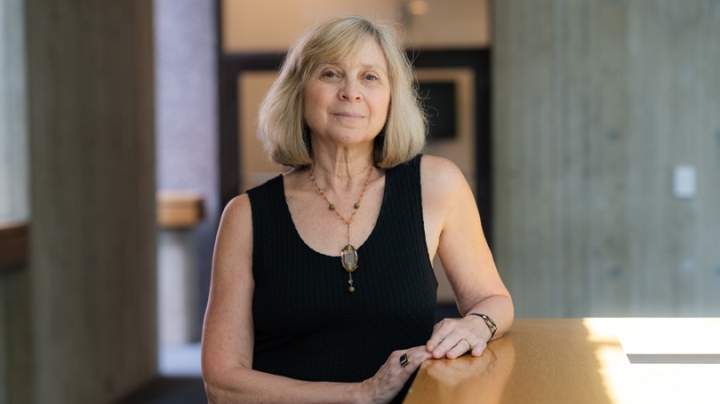Mona Domosh, the Joan P. and Edward J. Foley Jr. 1933 Professor of Geography, will become the next director of Dartmouth’s Society of Fellows, Provost Joseph Helble announced today.
Domosh follows the inaugural director, Randall Balmer, the John Phillips Professor in Religion.
“I want to thank Randall for five years of dedicated service, helping us get the Society of Fellows launched,” says Helble. “And I want to welcome Mona as the society’s next leader. Like Randall, she’s an outstanding scholar and teacher who has been a faculty fellow in the society almost from the start. I know she’ll chart a strong, collaborative future.”
The Society of Fellows was founded in 2014 by President Philip J. Hanlon ’77 to foster intellectual excellence and innovation at the highest levels across the institution. The society’s postdoctoral fellows, in collaboration with faculty, form an interdisciplinary community that integrates research and teaching.
Holding paid fellowships of up to 36 months, the fellows typically receive a non-tenure-track appointment as a lecturer in a department or program and teach two courses over the course of their time on campus. They receive support for their teaching from the Dartmouth Center for the Advancement of Academic Learning.
In addition to its new leader, the society has a new academic home. No longer a freestanding program, it is now part of the Guarini School of Graduate and Advanced Studies.
“I am pleased that Mona is taking the helm,” says Dean of Graduate Studies F. Jon Kull ’88, the Rodgers Professor of Chemistry. “She’s eager to weave the society into the Dartmouth community.”
Domosh says the society differs from postdoctoral fellows programs at other universities because it covers the full spectrum of academic activity, encompassing all divisions within the Faculty of Arts and Sciences, and it builds bridges to the professional schools—the Tuck School of Business, Thayer School of Engineering, and the Geisel School of Medicine.
As director, she plans to continue progress already underway to integrate the society fully into campus life and learning.
“We are a space for interdisciplinarity and innovation,” says Domosh. “But you still need academic disciplines. We need to strike a balance that allows people to be intellectually curious within their areas of expertise while at the same time challenging the boundaries of disciplinary knowledge.”
Another priority for Domosh is to promote shared, collective governance in the society.
“I’m interested in having the postdoctoral fellows lead us as much as we lead them,” she says. “Having these wonderful, smart, young, innovative scholars on campus at a formative time in their careers—there’s nothing more exciting than that. And it’s a two-way street. We learn as much from them as they learn from us.”
Domosh is eager to share with fellows her own work as a cultural geographer who studies urban spaces. “I’ve done several projects looking at the movement of corporations internationally, and I’ve begun to think of New York City as a kind of city center of the American empire,” she says.
Her 2006 book, American Commodities in the Age of Empire, examines the relationship between consumerism, commercialism, and imperialism in the late-19th and early-20th centuries. A forthcoming book will look at international development as a form of empire-building following World War II.
Kull says Domosh will guide the society through a few changes that will foster more collaboration among postdocs and faculty—not only senior, tenured faculty, but those at earlier stages in their careers. There will be three types of members: postdoctoral fellows; faculty fellows serving as principal mentors; and faculty affiliates nominated by the postdocs. The affiliates will be invited to all society events, broadening the range of disciplines represented in the program and providing fresh perspectives on today’s academic job market.
Applications are being accepted for the next cohort of postdoctoral fellows through Sept. 16.
Charlotte Albright can be reached at charlotte.e.albright@dartmouth.edu.
